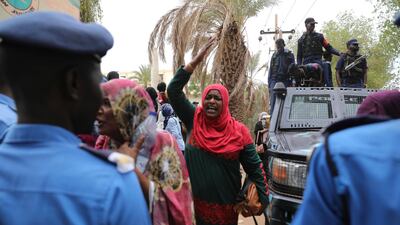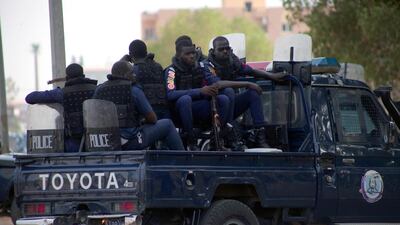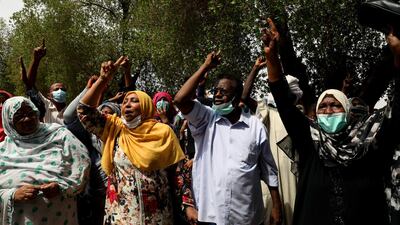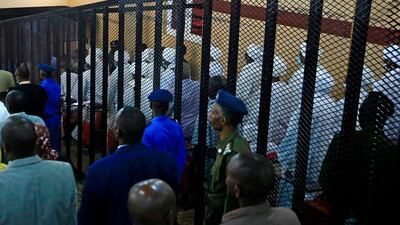On June 30, 1989, Sudan’s democratically-elected Prime Minister Sadeq Al Mahdi had been in office for nearly three years, leading a dysfunctional and unpopular government that had done little, maybe even nothing, to improve the country’s woeful economy and end a ruinous civil war in the south that had by then raged unabated for six years.
Long lines at gas stations were a common sight everywhere in Sudan. Lengthy power cuts plunged Khartoum, the capital, into darkness virtually every night. Streets had potholes the size of squash courts and South Sudanese displaced by the civil war in their region lived in squalor camps on the edge of the city, whose central district crawled with beggars and homeless children.
Sudan appeared to be on the verge of coming unglued on June 30, 1989, the day Omar Al Bashir, then an army brigadier-general and a veteran of the civil war in the south, staged a coup backed by Islamists. The coup toppled Mr Al Mahdi’s government and ushered in 29 years of dictatorship that, by 2019 when Al Bashir was removed from power, had put Sudan through the darkest chapter of its modern history.
So, fittingly, Al Bashir and more than two dozen associates, including two former vice presidents, senior army officers, ministers and provincial governors, went on trial on Tuesday for staging the 1989 coup.
Anniversary of the fall of Omar Al Bashir
They are charged with “destroying the constitutional order,” a crime punishable by death under Sudan’s penal code. Tuesday’s hearing, held under tight security, was mostly procedural. Al Bashir and his co-defendants were kept in a courtroom cage.
The trial was adjourned until August 11 to find a larger courtroom that would allow more lawyers and members of the defendants’ families to attend, according to presiding judge Issam Al Din Mohammed Ibrahim. A small crowd of Al Bashir supporters gathered outside the courthouse.
Al Bashir, 76, has been in detention since his removal by the military in April 2019 following months of deadly, youth-led street protests against his rule. He was convicted of corruption and sentenced to two years in a correctional facility last December. He is also facing separate charges linked to the killing of protesters during the December 2018-April 2019 street protests against his rule.
Sudan also decided in February to hand him over to the International Criminal Court to stand trial for genocide and crimes against humanity during an insurgency in the 2000s in the vast western region of Darfur. That conflict left at least 300,000 people dead and many more displaced, according to the UN.
In all likelihood, Al Bashir will spend the remainder of his life in prison, but his legacy will live on, casting a dark shadow on the vast Afro-Arab nation that has since independence from British rule in 1956 witnessed ruinous civil strife, famines, widespread institutional corruption and authoritarian rule.
When Al Bashir seized power in 1989, it was an all too familiar move given Sudan’s track record with military coups: a fiery statement on the state Omdurman radio, a curfew and the shutdown of the airport and overland border crossings.
He called it the “National Salvation Revolution” and promised the Sudanese better days ahead. He went to great lengths to hide the Islamist nature of the coup, even jailing the spiritual leader of and inspiration behind the coup - the late Islamic leader Hassan Al Turabi - to dispel any suspicions about the Islamist ideology of the new regime.
In the 60-plus years since independence, Sudanese army officers seized power in 1958, 1969 and 1989, each time toppling a democratically elected government. General Abdul-Rahman Swar El Dahab led a 1985 coup following a popular uprising against the 16-year rule of the late dictator Jaafar Nimeiri, but he handed over power to an elected government a year later.
But Al Bashir’s 29-year rule stands out from others led by other military men. It was by far the worst.
Under his watch, Sudan lost a third of its land mass and most of its oil wealth when the south seceded nearly a decade ago after some 20 years of civil war. It was also during his years at the helm that rebels took up arms against the government in the west and south of the country. Those rebellions continue to this day. Al Bashir’s Sudan also became a haven for Islamic militants, including the late Al Qaeda leader Osama Bin Laden who sojourned in Khartoum in the 1990s.
Sudan has seen many economic crises over the years, but those under Al Bashir’s rule were by far the worst and the latest of these triggered the initial spark for the street protests that led to his ouster.
In his 29 years in power, Al Bashir played his rivals off against each other to cement his grip on power. He filled the ranks of the security agencies, armed forces and civil service with loyalists and introduced a strict version of Islamic law that saw women lashed or imprisoned for not observing the modest dress code prescribed by authorities, the creation of intrusive morality police squads and systematic discrimination against ethnic Africans in the west and south of the country.
The transitional government currently in office has been trying to dismantle his legacy. However, many of the youths who led the uprising against his rule believe more must be done to ease Sudan back into the international fold after decades as a pariah state and to purge Al Bashir loyalists in the armed forces, the notorious security agencies and police.
More than three years of transitional rule began in August when a power-sharing agreement between the generals who removed Al Bashir and leaders of the street protests was reached.





















